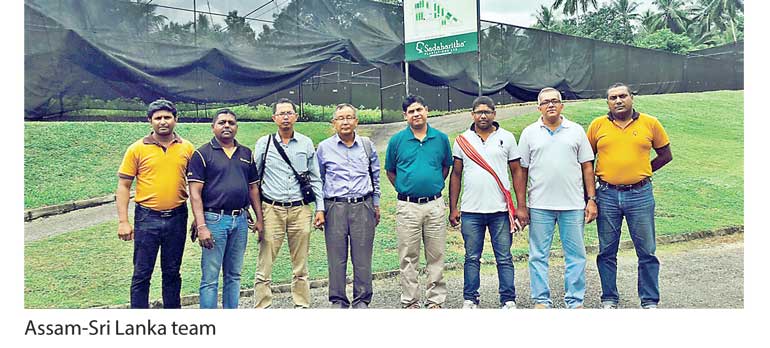Sunday Feb 22, 2026
Sunday Feb 22, 2026
Friday, 8 September 2017 00:00 - - {{hitsCtrl.values.hits}}
 A distinguished delegation from All Sanchi (Agar) Growers’ Association of Assam (ASGAA) has visited Sri Lanka recently, to strengthen the bilateral partnership with Sadaharitha Plantations in a joint expedition to share best practices in growing and marketing this unique species of trees and its value added products. Agarwood has proved to be the world’s most expensive as well as one of the endangered plants; nurturing Agarwood commercially has become a vital necessity for the industry.
A distinguished delegation from All Sanchi (Agar) Growers’ Association of Assam (ASGAA) has visited Sri Lanka recently, to strengthen the bilateral partnership with Sadaharitha Plantations in a joint expedition to share best practices in growing and marketing this unique species of trees and its value added products. Agarwood has proved to be the world’s most expensive as well as one of the endangered plants; nurturing Agarwood commercially has become a vital necessity for the industry.
Last year, a team from Sadaharitha toured Assam, known as India’s Agarwood capital to learn from their Indian counterparts about different practices adopted to make the crop thrive and become more lucrative. Now, a team has arrived in Sri Lanka to learn about how Agarwood is grown and harvested here, which will result in many ways for both organisations in future.
The team of delegates from Assam was headed by Professor Rajkumar Sing, the President of All Sanchi (Agar) Growers’ Association of Assam (ASGAA). Accompanying him were Bikash Borah, General Secretary, Demodar Boruah, Chief Program Coordinator and Phukun Prabhakar, Organising Secretary. They were warmly welcomed in an official conference headed by Sathis Nawrathna, Chairman of Sadaharitha Plantations. Delegates were facilitated to visit Asia’s largest Agarwood nursery in Ingiriya and Agarwood estates owned and managed by Sadaharitha.
The most important resin-producing species of Agarwood, A. Malaccensis, is protected worldwide under the Convention on International Trade in Endangered Species of Wild Fauna and Flora (CITES) as well as by the World Conservation Union (IUCN). Agarwood cannot be traded internationally without CITES permit to confirm that it has been harvested at a sustainable level to ensure the survival of the species. A. Crassna, another Agarwood species is listed as protected in Vietnam. With the authorities focusing on protecting Agarwood, the joint expedition by Assam growers and Sadaharitha is a farsighted, forward step to formulate strategies that would help the industry to flourish and strengthen its future.
Sadaharitha Plantations Chairman Sathis Nawarathna said, “We are now on our 15th year in the business of commercial forestry, and take pride in meaningfully contributing to the environment while offering Sri Lankan investors a lucrative alternative offering an attractive return on investment in the long term. Agarwood forests are typically ready for harvesting in eight years. Sadaharitha’s investment in Agarwood initiated in 2014 will be ready for harvesting in the year 2022. Joining hands with Assam growers will help us to benefit from their knowhow while they benefit from ours. Eventually Agarwood will become the main export crop for Sri Lanka generating billions of foreign revenue to the motherland.”
The two delegations will share best practices with the focused objective of strengthening product development and adding value to marketing opportunities. A much anticipated outcome from the joint expedition is a positive result of Agarwood benefiting the end-user market.